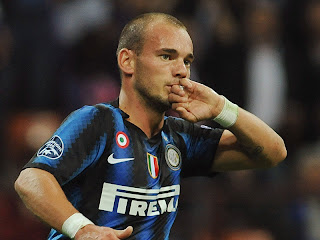It’s
fair to say that Inter have had better sts to the season. Although
they qualified from the Champions League group stage with a game to
spare, they currently languish in 16th place in Serie A.
Admittedly they have a game in hand, but they are still a colossal 14
points behind league leaders Juventus with a third of the season gone.
The triumphant 2009/10 season when the nerazzurri became the first Italian team to win the treble of the scudetto, the Coppa Italia
and the Champions League in a single year under the guidance of José
Mourinho seems a distant memory. Inter fans have become accustomed to
success, as that triumph meant that their team had won five league
titles in a row (including the one awarded to them for 2005/06 by the
courts after the calciopoli scandal).
There
are many reasons behind this decline, not least an aging squad, but
most of the problems are off the pitch. The board’s lack of a long-term
strategy is evidenced by the rapid turnover in coaches since the
“special one” moved to Real Madrid in the summer of 2010. Rafael
Benitez’s miserable six-month reign did not reach Christmas, while past
Brazilian international Leonardo lasted little longer, as he joined
Paris Saint-Germain in June 2011.
His
replacement, the former Genoa boss Gian Piero Gasperini, fared no
better, as he was unceremoniously sacked after four defeats in five
games, notable only for a plethora of formations that confused his own
team rather more than the opposition. The current incumbent, Claudio
Ranieri, brings vast experience to the role, but he is Inter’s fifth
manager in less than two years.

"Should I stay or should I go?"
The
club’s confusion is further highlighted by the names of the other
managers that they approached for the position, including the likes of
Fabio Capello, Guus Hiddink, André Villas-Boas and Marcelo Bielsa. If
you can discern any similarities in their tactical approaches, then
you’re a better man than me. Unsurprisingly, they all rejected the
poisoned chalice.



